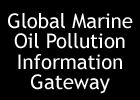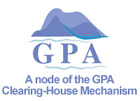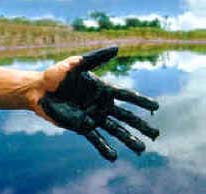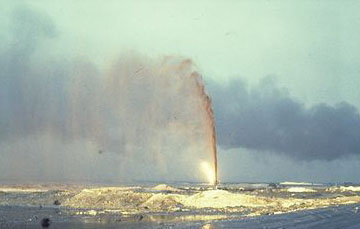|
International
actors and agreements in the region
 The
Gulf Region has been designated as a Special
Area for the purpose of Annex I (oil) to MARPOL
73/78. ROPME Member States have agreed to establish
a network of reception facilities for oily waste and
other wastes in accordance with the Special Area provisions.
UNEP is participating in the Task Team for a regional
arrangement for reception facilities (to be implemented
by the private sector).
The
Gulf Region has been designated as a Special
Area for the purpose of Annex I (oil) to MARPOL
73/78. ROPME Member States have agreed to establish
a network of reception facilities for oily waste and
other wastes in accordance with the Special Area provisions.
UNEP is participating in the Task Team for a regional
arrangement for reception facilities (to be implemented
by the private sector).
 See
Global action and Global
actors.
See
Global action and Global
actors.
 UNEP
Regional Seas Programme. ••>
UNEP
Regional Seas Programme. ••>
 UNEP Global programme of action for the protection of
the marine environment from land-based activities (UNEP
GPA). ••>
UNEP Global programme of action for the protection of
the marine environment from land-based activities (UNEP
GPA). ••>
 UNEP
Regional Office for West Asia (ROWA). ••>
UNEP
Regional Office for West Asia (ROWA). ••>
 UN Economic and Social Commission for Western Asia (ESCWA).
••>
UN Economic and Social Commission for Western Asia (ESCWA).
••>
 International
Coral Reef Initiative and other organizations and
networks on
the threats to coral reefs, including the effects of
litter/debris.
International
Coral Reef Initiative and other organizations and
networks on
the threats to coral reefs, including the effects of
litter/debris.
Regional
conventions, agreements, action plans and actors
 Kuwait
Regional Convention for Co-operation on the Protection
of the Marine Environment from Pollution (Kuwait Convention).
• Regional Organisation for the Protection of the
Marine Environment (ROPME). • See also Marine Emergency
Mutual Aid Centre (MEMAC). ••>
Kuwait
Regional Convention for Co-operation on the Protection
of the Marine Environment from Pollution (Kuwait Convention).
• Regional Organisation for the Protection of the
Marine Environment (ROPME). • See also Marine Emergency
Mutual Aid Centre (MEMAC). ••>
 Kuwait Convention Action Plan. ••>
Kuwait Convention Action Plan. ••>
 Jeddah Memorandum of Understanding • Jeddah Declaration.
••>
Jeddah Memorandum of Understanding • Jeddah Declaration.
••>
 Council of Arab Ministers Responsible for the Environment
(CAMRE) • Abu Dhabi Declaration. ••>
Council of Arab Ministers Responsible for the Environment
(CAMRE) • Abu Dhabi Declaration. ••>
 Gulf Cooperation Council (GCC). ••>
Gulf Cooperation Council (GCC). ••>
 Regional
Organisation for Conservation of the Environment of
the Red Sea and Gulf of Aden (PERSGA). ••>
Regional
Organisation for Conservation of the Environment of
the Red Sea and Gulf of Aden (PERSGA). ••>
Private
sector and NGOs actors and initiatives
 Regional Clean Sea Organisation (RECSO).
••>
Regional Clean Sea Organisation (RECSO).
••>
 Saudi
Aramco in central Saudi Arabia: Maintaining operations
in a sensitive environment. Case study presented by
IPIECA.
Saudi
Aramco in central Saudi Arabia: Maintaining operations
in a sensitive environment. Case study presented by
IPIECA.
 Oilwatch. ••>
Oilwatch. ••>
 International Tanker Owners Pollution Federation (ITOPF).
••>
International Tanker Owners Pollution Federation (ITOPF).
••>
 International Directory of Oil Spill Cleanup Contractors
and Response Organisations. ••>
International Directory of Oil Spill Cleanup Contractors
and Response Organisations. ••>
 International Petroleum Industry Environmental Conservation
Association (IPIECA). ••>
International Petroleum Industry Environmental Conservation
Association (IPIECA). ••>
|
 |
Regional
reports on the state of the environment
 "Desk
Study on the Environment in Iraq". Study (April 2003)
by UNEP's
Post Conflict Assessment Unit (PCAU). A preliminary
assessment of the most pressing environmental challenges
facing those involved in the post-conflict humanitarian
relief and reconstruction effort. Prepared in collaboration
with relevant UNEP-GRID centers, and with the UNEP Regional
Office for West Asia (ROWA). As for the impact of oil
on the marine environment, there had at the time of writing
been no reports on any major marine pollution incidents
in the Gulf.
"Desk
Study on the Environment in Iraq". Study (April 2003)
by UNEP's
Post Conflict Assessment Unit (PCAU). A preliminary
assessment of the most pressing environmental challenges
facing those involved in the post-conflict humanitarian
relief and reconstruction effort. Prepared in collaboration
with relevant UNEP-GRID centers, and with the UNEP Regional
Office for West Asia (ROWA). As for the impact of oil
on the marine environment, there had at the time of writing
been no reports on any major marine pollution incidents
in the Gulf.
 UNEP
Regional Office for West Asia: State
of the Environment in West Asia: "In
West Asia, the challenges that are associated with marine
and coastal issues include oil pollution, sewage and
other land-based effluents, the physical alternation
of coastal areas, including land-filling, dredging,
and modification of river course". -- The regional
marine environment has been subjected to pressures from
an unprecedented rate of industrial and urban growth,
over 75 per cent of which has been in the coastal areas.
The two Gulf Wars in the region have worsened the situation
by depositing oil and oil-burn products into the marine
environment in addition to the physical destruction
of industrial and agriculture infrastructure in the
Shat Al-Arab estuary area."
UNEP
Regional Office for West Asia: State
of the Environment in West Asia: "In
West Asia, the challenges that are associated with marine
and coastal issues include oil pollution, sewage and
other land-based effluents, the physical alternation
of coastal areas, including land-filling, dredging,
and modification of river course". -- The regional
marine environment has been subjected to pressures from
an unprecedented rate of industrial and urban growth,
over 75 per cent of which has been in the coastal areas.
The two Gulf Wars in the region have worsened the situation
by depositing oil and oil-burn products into the marine
environment in addition to the physical destruction
of industrial and agriculture infrastructure in the
Shat Al-Arab estuary area."

 UNEP GPA: Overviews
on Land-based Sources and Activities Affecting the Marine
Environment in the ROPME Sea Area. According
to the report, as much a two million barrels of oil
could be spilled into the waters of the region every
year from operational discharges from tankers and platforms.
It is further stated that discharges from tankers of
crude and fuel oil wastes remain the most serious marine
pollution problem of the region. As a consequence, oil
and hydrocarbons are rated has the issue having the
highest priority in the region.
UNEP GPA: Overviews
on Land-based Sources and Activities Affecting the Marine
Environment in the ROPME Sea Area. According
to the report, as much a two million barrels of oil
could be spilled into the waters of the region every
year from operational discharges from tankers and platforms.
It is further stated that discharges from tankers of
crude and fuel oil wastes remain the most serious marine
pollution problem of the region. As a consequence, oil
and hydrocarbons are rated has the issue having the
highest priority in the region.
 UNEP GPA: ROPME
Sea Region (brief description of environmental state,
priority issues).
UNEP GPA: ROPME
Sea Region (brief description of environmental state,
priority issues).
 UNEP:
Global
Environment Outlook 3 (GEO3). Coastal and marine
areas.
UNEP:
Global
Environment Outlook 3 (GEO3). Coastal and marine
areas.
 University
of Rhode Island: Large Marine Ecosystems (LME): The
Region comprises a part of the
Arabian Sea LME.
University
of Rhode Island: Large Marine Ecosystems (LME): The
Region comprises a part of the
Arabian Sea LME.
|




